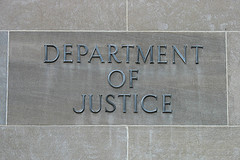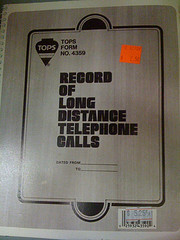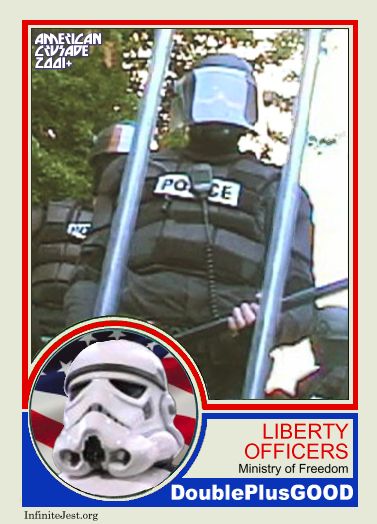Copyright 2007-25 Digital Media Law Project and respective authors. Except where otherwise noted,
content on this site is licensed under a Creative Commons Attribution-Noncommercial-ShareAlike 3.0 License: Details.
Use of this site is pursuant to our Terms of Use and Privacy Notice.
content on this site is licensed under a Creative Commons Attribution-Noncommercial-ShareAlike 3.0 License: Details.
Use of this site is pursuant to our Terms of Use and Privacy Notice.


 On February 21, 2014, the U.S. Department of Justice released its
On February 21, 2014, the U.S. Department of Justice released its  As has been
As has been  From the credit-where-credit's-due department (with the requisite hat-tip to
From the credit-where-credit's-due department (with the requisite hat-tip to  A filmmaker's fight against an oil company seeking his raw documentary footage has spurred a national debate on the
A filmmaker's fight against an oil company seeking his raw documentary footage has spurred a national debate on the  A mid-level appellate court in Illinois ruled on Tuesday that the publisher of a local newspaper must reveal the identity of a pseudonymous Internet commenter. In
A mid-level appellate court in Illinois ruled on Tuesday that the publisher of a local newspaper must reveal the identity of a pseudonymous Internet commenter. In  In an
In an  In recent years, the American public seems to have fallen under the impression that providers and regulators of airline travel have extra-legal powers. These fictional powers typically mean that passengers can be
In recent years, the American public seems to have fallen under the impression that providers and regulators of airline travel have extra-legal powers. These fictional powers typically mean that passengers can be 
Description:
Malcolm Harris is one of hundreds of protesters charged with disorderly conduct after the Occupy Wall Street protest march across the Brooklyn Bridge in October 2011. In the course of this investigation, on January 26, 2012, the New York County District Attorney issued a subpoena to Twitter to appear as a witness in Harris's trial in the Criminal Court of the City of New York, presenting "any and all information" regarding Harris's account @destructuremal from September 15 to December 31, 2011. Twitter notified Harris of the subpoena on January 30, 2012.
Harris reponded to this subpoena by filing a motion to quash on February 6, 2012. In this motion, Harris argued that the subpoena was overbroad and failed to comply with federal and state procedural requirements for electronic information requests.
On April 20, 2012, Manhattan Criminal Court Judge Matthew Sciarrino Jr. denied Harris's motion. Judge Sciarrino held that Harris lacked a proprietary interest in his tweets, so as in bank record cases where an individual lacks standing to challenge a subpoena issued against the third-party bank, Harris lacked standing to quash a subpoena issued to a third-party online social networking service seeking to obtain his postings. In addition, Judge Sciarrino found that were "reasonable grounds to believe the information sought was relevant and material to this investigation" under the Stored Communications Act.
On May 7, 2012, Twitter filed its own motion to quash Judge Sciarrino's order and the subpoena. In this motion, Twitter argued that the order would violate Twitter's terms of service provisions, which state that users retain rights to any content posted on the site, thereby holding a proprietary interest in their content. In addition, citing the Supreme Court's 2012 decision in United States v. Jones, Twitter argued that enforcing the subpoena would violate the Fourth Amendment, which only requires service providers to disclose user communications when presented with a valid search warrant.
Twitter's motion to quash was denied by Judge Sciarrino on June 30, 2012. In addition to reasserting holdings from his April 20th order, Judge Sciarrino's held that there is no expectation of privacy when participating in a social media forum like Twitter, so no Fourth Amendment privacy interest would be implicated by the subpoena. Twitter intends to appeal this decision, having filed a notice of appeal on July 17, 2012.
Update:
On August 20, 2012, Harris filed a petition and memorandum under Article 78 of the CPLR to order Judge Sciarrino to reverse the order to reveal the information stored by Twitter. According to the case docket, Harris also seeks a temporary restraining order preventing the disclosure of the information, with a hearing date of September 21, 2012.
According to a subsequent pleading by Twitter, on August 20, 2012, the court asked Twitter to show cause as to why the court should not impose civil and criminal sanctions for contempt of court, in light of Twitter's lack of disclosure of the information at issue. That order had a response deadline of September 5, but on August 23 Twitter moved for a stay of all Criminal Court proceedings pending resolution of their appeal. The Appellate Term granted a temporary stay, but then vacated that stay in an order on September 7, 2012.
Meanwhile, on August 27, 2012, Twitter filed their appellate brief before the Appellate Term of the Supreme Court for New York County. The ACLU, NYCLU, EFF, and Public Citizen filed an amicus brief in support of Twitter.
On September 11, 2012, Twitter filed a memorandum in opposition to the order to show cause before the Criminal Court of the City of New York. Twitter argued that being forced to reveal the information before the appeal of the order would render the issue moot, and thus would prevent proper adjudication of the validity of the order.
According to Bloomberg, on a hearing on September 11, 2012, Judge Sciarrino rejected Twitter's arguments and ordered Twitter to comply or face substantial monetary fines.
According to the Washington Post and Village Voice, Twitter and Judge Sciarrino reached an agreement whereby Twitter turned over the contents requested on September 14, 2012 in a sealed envelope, and the Judge agreed not to open the contents until the hearing on Harris's Article 78 petition before the Appellate Term of the Supreme Court for New York County on September 21, 2012.
On September 27, 2012, the Supreme Court for New York County's Appellate Term issued an order denying Harris's application to stay enforcement in his Article 78 proceeding. According to the New York Times, the subpoena was subsequently enforced, and Harris pleaded guilty to the charges.